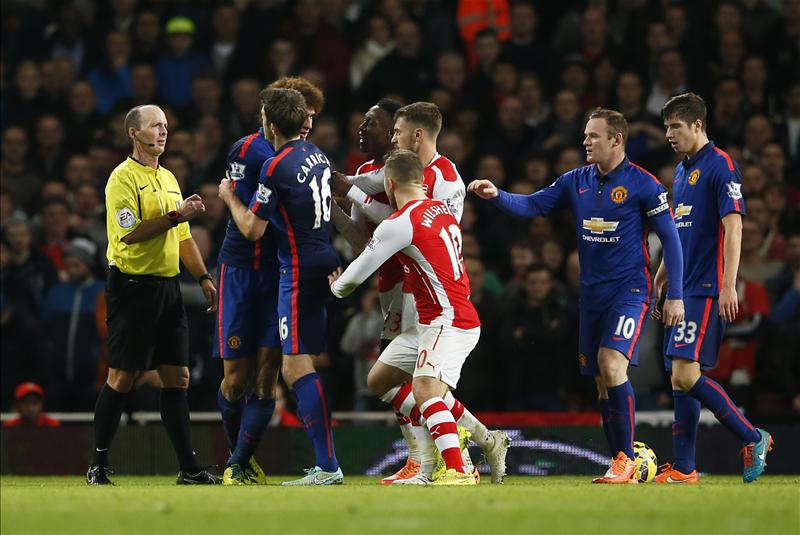
Most interpreted this as an unacceptable act of violence on Jack Wilshere’s part – even The Daily Mail could not resist getting in on the act, lambasting Wilshere for his apparently unprovoked show of aggression towards the Belgian (continuing in the Mail’s fine tradition of standing up for immigrants, of course). However, let’s not be too quick to judge. Firstly, this was too funny to really be taken seriously (after all, the actual level of threat which Wilshere posed in thrusting his head up to just below the lofty Belgian’s chin was roughly equivalent to this).
And secondly, being myself closer to Wilshere than to Fellaini in the height stakes, I can empathise with the Arsenal midfielder’s attempt to reset the balance, to bring the large down to the level of the little for once. In this context, we might even see this as a heroic act. But more than anything, let’s see this as an opportunity, a new dawn on the footballing horizon: why not line up the Premier League’s tallest and smallest and unleash an almighty David-and-Goliath-esque battle for supremacy? Following Fellaini and Wilshere’s lead, how about pitting Arsenal’s Santi Cazorla and Per Mertesacker against one another? Or even Stoke’s Bojan Krkic and Peter Crouch? I would pay to see that. They could even put them on during half-time.
Yet while Wilshere found himself vilified, Fellaini was praised for not falling over in a heap – although the expression on his face did suggest more confusion at what was going on than restraint in not reacting to Wilshere’s provocation. In fact, this incident fitted nicely into the theme of the weekend, which saw something of a quiet revolution in terms of how the art of diving (or, as it is euphemistically known, “simulation”) is viewed in the Premier League today. Because this weekend it was not the foreign hordes throwing themselves to the ground at the slightest whiff of contact (or even without it, they weren’t fussy), but rather – cue gasps – the English players!
In stark contrast to Fellaini’s reaction, Everton’s game with West Ham at Goodison Park was a veritable showcase of “simulation”. Little did Kevin Mirallas know that when he shoved James Tomkins in the chest, he would set in motion a chain of biomechanical events which led to the West Ham defender feeling severe pain in his right eye (so intense, in fact, that he would then fall to the ground). Kevin Nolan, on the other hand, was not too pleased when Ross Barkley did his best impression of a salmon flopping up-river, despite the lack of any contact from the West Ham captain.
Earlier in the afternoon, at the Brittania Stoke’s Victor Moses compounded his team’s miserable defeat to Burnley by enhancing his burgeoning reputation as one of the most “theatrical” (another brilliant euphemism) players in the league. (In fact, “burgeoning” might be doing a disservice to Moses, as by now his reputation is sufficiently established that when googling “Victor Moses” the first suggestion offered is “Victor Moses dive”.)
But it is not simply that there are more home-grown players diving in the Premier League; the important aspect to this phenomenon is that there is now a greater consciousness that “simulation” it is not the preserve of the overseas imports to the Premier League. Surprisingly, even English football is awaking from the dark ages, coming to realise that the English players are not the saints they are made out to be by Sky Sports and The Daily Mail, nor foreign players all cheats. Maybe, just maybe, at long last the Premier League is growing up. One day, who knows, English football might even stand as the last bastion of progressive thinking in England, against the unrelenting swell of mindless, Ukip-fuelled jingoism which perpetuates such stereotypes.
But for now, at least there are some foreigners who live up to their reputations, such as Tottenham’s own Jan Vertonghen, who undoubtedly had a part to play in the dismissal of Hull’s Gastón Ramírez as he went to ground following an innocuous-looking kick from the Uruguyan. And this granted an insight into another aspect of the whole diving phenomenon: Steve Bruce, incensed by Vertonghen’s behaviour, complained that Vertonghen, “a big, huge, strapping centre-back”, had gone down as if “pole-axed”. There is a sense that diving is seen as cowardly and – perhaps more significantly for those enveloped within the football bubble – as distinctly “un-manly”, the act of falling over being particularly emasculating in some sense. Likewise Kevin Kilbane, on Sunday night’s Match Of The Day 2, asserted that “if someone hits you, you want to hit them back,” feeding this idea of male bravado and reinforcing the concept of “what it is to be a man”.
All of which, ironically, leads us back to Wilshere and Fellaini. Is Fellaini “more of a man” because he did not roll around on the floor in an attempt to get his opponent sent off? Or is it Wilshere, who in a show of masculine brawn (and recklessness) asserted himself through physical violence? Or is it this guy (again)? Who knows. Does it even matter?
The diving phenomenon does, though, open our eyes to the way that football treats concepts such as “foreignness” or “manliness” – in a very fixed and antiquated way – and that, even if some of these ideas are slowly starting to be challenged and broken down, there is still a long way to go. Until then, we’ll just have to content ourselves with more of this gloriousness.






